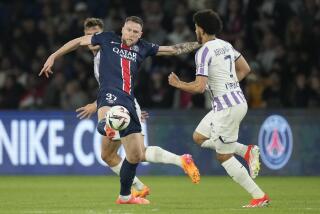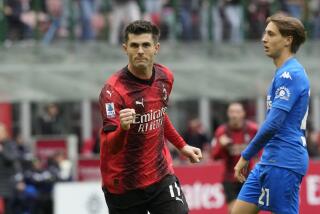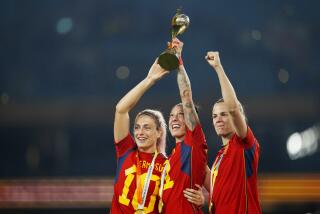Smashing Champions League Returns
- Share via
On May 27, not even four months ago, half a million fans packed the streets of Manchester, England, to greet the players they had regarded as heroes before but now looked upon as gods.
On the open-topped, double-decker bus carrying those players--giant Danish goalkeeper Peter Schmeichel, midfielder David Beckham of Spice Girls connections, Norwegian striker Ole Gunnar Solskjaer, and all the rest--the European Champions Cup was proudly passed from hand to hand.
It had taken Manchester United 31 years to reclaim the trophy it had last won in 1968, when George Best and Bobby Charlton were lacing up their boots.
Victory had been achieved before 90,000 fans at Nou Camp stadium in Barcelona, courtesy of the most improbable 2-1 result imaginable. Manchester United was losing to Bayern Munich, 1-0, and the game was in the last 90 seconds of injury time.
But two late substitutes changed history. First, Teddy Sheringham tied the score, then, moments later, Solskjaer won it.
The English tabloids, not surprisingly, had a field day.
“Our Subs Sink Germans,” said the Sun. “Hunbelievable,” said the Daily Star. It was, said the Daily Mail, “football’s equivalent of turning water into wine.”
Even staid newspapers couldn’t believe it.
“God is English,” said France’s L’Equipe.
Tuesday, it begins all over again.
The qualifying rounds are finished and the 32 teams that will battle over the next eight months have been determined. At the end of the road lies not only the right to be called champion of Europe but the $55 million the winning team will receive.
The European Champions League, televised live around the world--including the U.S.--has become the most closely followed club soccer event on the planet. Only the World Cup and the European Championship, both for national teams, surpass it.
According to UEFA, European soccer’s governing body, this year’s tournament will bring in $527.7 million in gross television and sponsorship revenue. Three-quarters of that will be divided among the participating clubs, depending on how far they advance.
The reason for its success is simple: The top players in the world, no matter their nationality, gravitate to the top clubs in the world, and they are all in Europe.
The Champions League is soccer’s equivalent of the NFL or NBA. Other leagues may play football or basketball, but none put on quite the same show.
“I always said we would never be judged as a great team until we had won the Champions League,” Manchester United’s Welsh winger Ryan Giggs said. “We’ve done that now.”
How important is winning? Well, Coach Alex Ferguson got a knighthood from Queen Elizabeth II for accomplishing the feat. Sir Alex can tell you its importance.
So can those who come close.
Germany’s mass-circulation Bild called what happened to Bayern Munich in Barcelona, “the worst two minutes in our football history.”
This time around, the tournament has been expanded to 32 teams, up from 24. Teams from 19 countries have qualified in eight groups.
With only two teams advancing from each group after first-round play, some big-name clubs are going to be making early exits.
In Group A, for example, are Spanish champion Barcelona, Arsenal of England, Fiorentina of Italy and AIK Stockholm of Sweden.
“We haven’t had much luck once again,” moaned Barcelona’s Dutch coach, Louis Van Gaal.
Last season, Barcelona was in the same group as both finalists and didn’t make it through.
Manchester United has been installed as the favorite, just ahead of Lazio, which defeated Manchester United in the recent European Super Cup; AC Milan, Barcelona, Bayern Munich and Real Madrid.
As usual, the top clubs spent millions this summer.
Real Madrid, for example, put out $35.7 million last month to buy French striker Nicolas Anelka from Arsenal. AC Milan parted with $25 million to sign forward Andriy Shevchenko from Dynamo Kiev. Arsenal bought French star Thierry Henry from Juventus for $16.5 million. Bayern Munich lured Brazil’s Paulo Sergio from AS Roma for $15 million. Fiorentina nabbed Germany’s Joerg Heinrich from Borussia Dortmund for $13.7 million. Barcelona got the Dutch twins, Ronald and Frank De Boer, for $22 million from Ajax Amsterdam. And so on.
The Anelka trade, and before that, Christian Vieri’s $50-million move from Lazio to Inter Milan in June, have set off alarms at UEFA headquarters.
Last Wednesday, UEFA opened the possibility of imposing maximum salaries. Anelka, for instance, is only 20, has not accomplished much of anything--he wasn’t on France’s 1998 World Cup-winning team--and yet earns a reported $3.9 million a year.
UEFA established a task force to consider a salary cap and announced that it will impose trading deadlines next season.
Those, however, are boardroom decisions. The fans’ interest lies on the field and their focus is on Tuesday and the beginning of Champions League play.
And for once there is actual American involvement. When Germany’s Bayer Leverkusen plays host to Lazio of Italy on Tuesday, one of its wingers will be Frankie Hejduk, the “surfer dude” formerly of Cardiff by the Sea, UCLA and the U.S. national team.
Similarly, when the Rangers travel to Spain to play Valencia on Wednesday, it will be U.S. national team midfielder Claudio Reyna guiding the Scottish team’s play. In August, Reyna was named player of the month in Scotland by the Scottish Football Writers’ Assn. and is among the league’s top scorers.
QUICK PASSES
Todd Saldana is showing early on that he was the correct choice to replace the Galaxy’s Sigi Schmid as UCLA’s coach. He has the Bruins ranked No. 1 in the country after victories over Westmont College (3-0), Denver (6-0) and Syracuse (2-1).
Midfielder Sasha Victorine scored the first Bruin hat trick since 1997 in the Denver game. Victorine, of Corona, and defender Carlos Bocanegra, of Alta Loma, have been selected as finalists for the Hermann Trophy, college soccer’s equivalent of the Heisman.
The largest crowd to see a soccer game in Kansas City is 21,141 for the Wizards’ opening game in 1996. That mark will fall Oct. 7. Already, 22,767 tickets have been sold for the USA-Finland women’s game on that date. Three days later, Oct. 10, Coach Tony DiCicco’s team plays Brazil in Louisville, where 28,000 tickets already have been sold. . . . The U.S. Open Cup has fittingly been renamed the Lamar Hunt U.S. Open Cup in honor of the man who has poured millions of dollars into soccer in this country for the better part of 30 years.
Isn’t it odd how two former U.S. national team coaches can’t win for losing in Major League Soccer? Bora Milutinovic’s New York/New Jersey Metrostars are 5-22 and have lost 12 in a row. Bob Gansler’s Kansas City Wizards are 8-19.
Francisco Maturana’s resignation as coach of Costa Rica’s national team has prompted speculation that Milutinovic will be offered his old job back. He led Costa Rica to the second round of the 1990 World Cup, which, incidentally, was won by Germany, captained by Lothar Matthaeus. And Matthaeus, who recently signed to play next year for the Metrostars, last week put more clouds on that team’s horizon by saying he wouldn’t mind coaching it. “It could be that Bora gives up--then I could take over,” he told the weekly magazine, Sport Bild.
Guiseppe Bergomi, who retired last season at Inter of Milan after playing in three World Cups for Italy, is being courted by the MetroStars, through Matthaeus, and the New England Revolution, through its coach and Bergomi’s former Italy teammate, Walter Zenga.
(BEGIN TEXT OF INFOBOX / INFOGRAPHIC)
European Champions League 1999-2000
The 32 teams have been drawn into eight groups of four. In the first round, beginning Tuesday, each team will play the others in its group, home and away, the top two finishers advancing to the round of 16.
GROUP A--Bayer Leverkusen (Germany), Dynamo Kiev (Ukraine), Lazio (Italy), Maribor Teatanic (Slovenia).
GROUP B--AIK Stockholm (Sweden), Arsenal (England), Barcelona (Spain), Fiorentina (Italy).
GROUP C--Boavista (Portugal), Borussia Dortmund (Germany), Feyenoord (Netherlands), Rosenborg Trondheim (Norway).
GROUP D--Croatia Zagreb (Croatia), Manchester United (England), Olympique Marseille (France), Sturm Graz (Austria).
GROUP E--Molde (Norway), Olympiakos (Greece), Porto (Portugal), Real Madrid (Spain).
GROUP F--Bayern Munich (Germany), Rangers (Scotland), PSV Eindhoven (Netherlands), Valencia (Spain).
GROUP G--Bordeaux (France), Spartak Moscow (Russia), Sparta Prague (Czech Republic), Willem II Tilburg (Netherlands).
GROUP H--AC Milan (Italy), Chelsea (England), Galatasaray (Turkey), Hertha Berlin (Germany).






